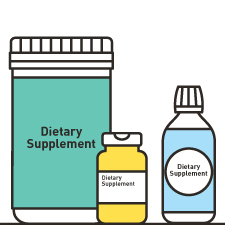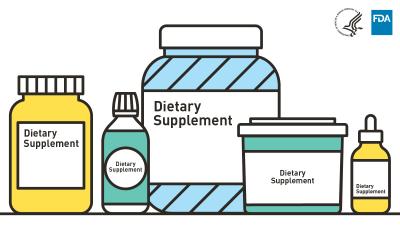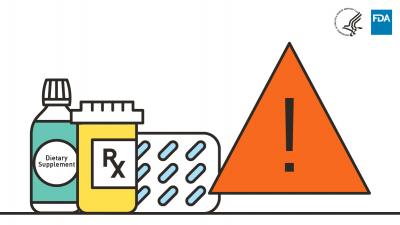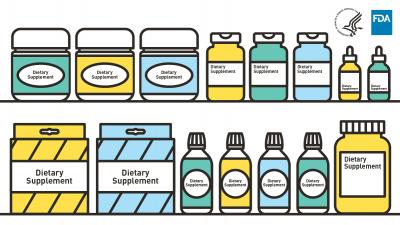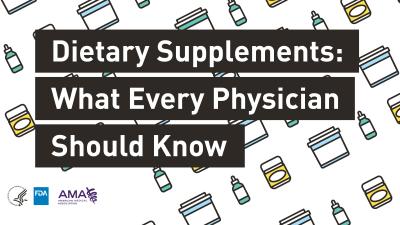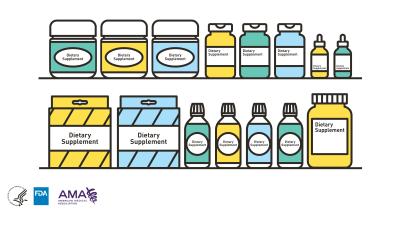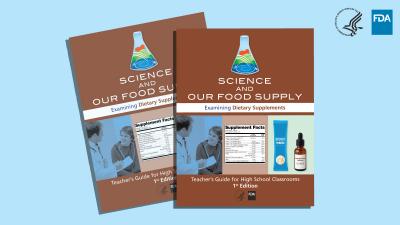Spread the Word about Dietary Supplements - Social Media Toolkit
<< Supplement Your Knowledge Education Initiative
Help the U.S. Food and Drug Administration (FDA) spread the word about the Supplement Your Knowledge initiative and educate your partners, followers, subscribers, students, and other audiences about dietary supplements with the newsletter text, social media posts, images, videos, and educational resources below.
Note: To use the images shown below, copy and paste or right-click on the image and save to your computer.
Consumers | Healthcare Professionals | Teachers
Announcement for Newsletters, Blogs, or Websites
Dietary supplements can be beneficial to your health, but they can also involve health risks. When you take too much of a dietary supplement or take supplements with prescription or over-the-counter medicines, you can have a bad reaction—also called an adverse event. And, if you take dietary supplements instead of prescribed medicines, the results potentially could be life-threatening.
So, it’s important to talk to your doctor, nurse, dietitian, or pharmacist before taking a dietary supplement. Ask if the supplement is right for you, if you are taking the right amount, and if it’s okay to combine supplements or take a supplement along with any medications you’re currently taking.
For more information about dietary supplements, including how they are regulated by the U.S. Food and Drug Administration (FDA) and how to report adverse events, visit www.fda.gov/dietarysupplements.
Facebook and X Posts
How are dietary supplements regulated? What are the benefits? Risks? If you want to know more, FDA has the answers. https://go.usa.gov/xuAGK
Always talk with your doctor or other healthcare professional about any supplements you are taking or considering…and do your research. You can find important facts about dietary supplements on FDA’s website. https://go.usa.gov/xuAGK
Dietary supplements can be beneficial to your health. But some can also come with risks, especially if you take high doses, multiple supplements, or with some medications. Learn more at FDA’s website. https://go.usa.gov/xuAGK
Did you know there are currently tens of thousands of dietary supplements available in the United States and about three-quarters of Americans report taking them? Learn how FDA helps keeps you safe at https://go.usa.gov/xuAGK
Downloadable Factsheets and Infographic
-
Understanding Dietary Supplements
Comprender los suplementos dietéticos -
Talking to Healthcare Professionals About Dietary Supplements
Hablar con los profesionales de la salud sobre los suplementos dietéticos -
Dietary Supplements: Report Adverse Events to FDA
Suplementos dietéticos: Informe los eventos adversos a la FDA -
Dietary Supplements: How FDA Helps Keep You Safe
Suplementos dietéticos: Cómo la FDA le protege
Videos
Dietary Supplements Overview
Dietary Supplements and Medications
Dietary Supplements and Adverse Events
Announcement for Newsletters, Blogs, or Websites
Your patients may take dietary supplements, whether recommended by you or on their own, for a variety of reasons. Some supplements can help your patients meet the daily requirements of essential nutrients or can help improve or maintain their overall health. But dietary supplements may also come with health risks that your patients should know about.
The U.S. Food and Drug Administration (FDA) in collaboration with the American Medical Association (AMA) has developed a continuing medical education (CME) program to help you understand how dietary supplements are regulated and give you strategies to counsel patients about their benefits and risks. The CME program includes three videos and companion education materials available free of charge on FDA’s Healthcare Professionals website. Interested physicians can also access these materials at no cost on the AMA Ed HubTM and earn 0.50 AMA PRA Category 1 Credit(s)TM.
Facebook and X Posts
Physicians: FDA and AMA have developed a CME program to help you learn more about dietary supplements. Topics include how dietary supplements are regulated, potential interactions, adverse events, and how to report them to FDA. Learn more at https://go.usa.gov/xuAGp
Physicians and other healthcare professionals can learn more about dietary supplements and get strategies for counseling patients about their benefits and risks. Watch FDA’s videos and earn CME credit. https://go.usa.gov/xuAGp
Physicians: talk to your patients about dietary supplements during your review of their medical health history. These videos from FDA will give you the facts you need to answer your patients’ questions. Watch and earn CME credit. https://go.usa.gov/xuAGp
Pharmacists: FDA encourages you to talk to consumers about the benefits and risks of taking dietary supplements. Review FDA’s educational materials for more information about how dietary supplements are regulated, interactions with medications, adverse events, and how to report them to FDA. https://go.usa.gov/xuAGp
Downloadable Factsheets
-
Dietary Supplements: What Physicians Should Know
Suplementos dietéticos: Lo que los médicos deben saber -
Dietary Supplements: What Pharmacists Should Know
Suplementos dietéticos: Lo que los farmacéuticos deben saber -
Dietary Supplements and Adverse Events
Suplementos dietéticos y eventos adversos
Continuing Medical Education Videos
Module 1: What Physicians Should Know – Part 1
Module 2: What Physicians Should Know – Part 2
Module 3: What You Need to Know About Dietary Supplements
Announcement for Newsletters, Blogs, or Websites
Dietary supplement labeling can be confusing or misleading. Teens are particularly vulnerable targets for misunderstanding what dietary supplements are, and they are often unaware of the potential benefits and adverse effects they can have on their bodies. The U.S. Food and Drug Administration’s (FDA) Science and Our Food Supply: Examining Dietary Supplements (2021 Edition) is designed to empower students to evaluate the accuracy and credibility of information they see and hear about dietary supplements.
This curriculum is designed for use by high school teachers and can be customized to science, health, and related classes. The curriculum aligns with current education standards and supports educators seeking Science, Technology, Engineering, and Mathematics (STEM) activities for their classrooms.
Facebook and X Posts
High school teachers: Now you can add dietary supplements to your curriculum. FDA’s Science and our Food Supply: Examining Dietary Supplements Teacher’s Guide can be customized for your science or health-related classes. Download it now. https://go.usa.gov/xuAGG
High school teachers: FDA’s Science and Our Food Supply: Examining Dietary Supplements Teacher’s Guide is designed to empower students to evaluate the accuracy and credibility of information they see and hear about dietary supplements. Learn more: https://go.usa.gov/xuAGG


